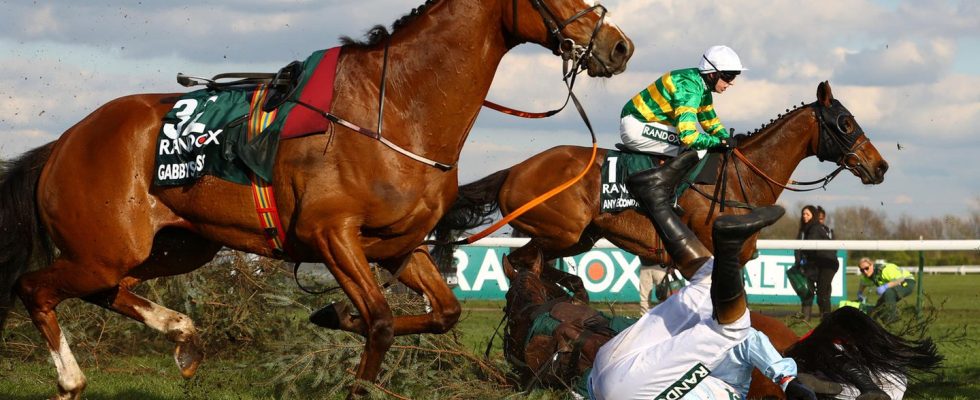Three horses dead, 118 activists arrested
Fatal falls at England’s most famous horse race. Is that still up to date?
Dangerous for horse and rider: fall scene from the Grand National Festival in Aintree
©Michael Steele/Getty Images
The Grand National is England’s most spectacular horse race – and highly controversial because of its dangerousness. Now there have been several fatal accidents and more than a hundred arrests by animal rights activists.
The notorious Grand National horse race in Aintree, northern England, made headlines this weekend. The unfortunate result of this year’s edition of the traditional race: three dead horses, 118 arrests of activists – and a newly ignited discussion about the question: does all this really have to be?
The Grand National has been held since 1836 and is considered the most valuable steeplechase race for horses in Great Britain. It also enjoys absolute public festival status. Not only do tens of thousands of spectators come to the racecourse in Aintree near Liverpool. Across the country, friends and colleagues bet on the outcome of the races, making it one of the highest-stakes events as well.
At the same time, the Grand National has been criticized by animal rights activists for years. The course is considered to be extremely dangerous for both horse and rider, as the animals rush side by side over the difficult obstacles. Despite various measures to defuse the course, fatal falls of horses occur again and again. This is also the case with the current edition.
Grand National at Aintree
Protests, police action on the racetrack – and a happy winner
Animal rights activists storm the route, shortly afterwards a horse dies
In the main race on Saturday in front of 70,000 spectators, the horse “Hill Sixteen” fell at the first fence and broke his neck. The ten-year-old animal died shortly thereafter. It was the third fatal accident at this year’s Aintree. Also on Saturday, at an earlier race, the horse “Dark Raven” suffered fatal injuries. At the start of the festival on Thursday, “Envoye Special” had already met the same fate.
Immediately before the start of the main race, which ended fatally for “Hill Sixteen”, animal rights activists had stormed the route to protest against the dangerous spectacle. The police removed them and the race started 14 minutes late. According to British media, the police arrested a total of 118 activists who had tried to disrupt the race.
Activists call for the spectacle to end
Apart from the action on the route, animal welfare activists had also blocked an access road by sticking themselves to the roadway. “This horrible ‘sport’ continues to take lives before our eyes. It’s time to ban this horrible industry,” animal rights organization Animal Rising, whose members were involved in the actions, said on Twitter. Around 17,000 people had signed a corresponding online petition by Sunday.
The roughly seven-kilometre circuit in Aintree is considered so dangerous that many of the best and most valuable steeplechase horses don’t even compete there. While obstacles have been defused and the number of starters limited to prevent fatal falls since the 1990s, the problem still exists. According to Animal Rising, 55 horses have also died at Aintree since 2000, including 15 at the Grand National itself. “These beautiful animals suffer because of tradition – and because of the betting industry,” writes Animal Rising.
After the recent incidents, the well-known animal protection organization RSPCA (Royal Society for the Prevention of Cruelty to Animals), one of the oldest and largest charity organizations in Great Britain, called on the British Horseracing Authority to immediately investigate the current deaths at the Grand National and announced further steps . It remains to be seen whether anything will change fundamentally. Shortly after “Hill Sixteen” broke his neck, “Corach Rambler” won the 175th edition of the Grand National.
Sources: The Guardians / BBC / Daily Mail / Animal Rising (Petition)


